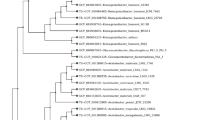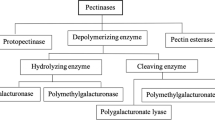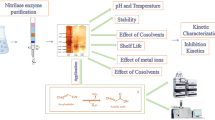Abstract
Objectives
To acquire a thermostable xylanase, that is suitable for xylooligosaccharide production from pretreated corncobs, the metagenomic method was used to obtain the gene from an uncultured environmental microorganism.
Results
A thermostable xylanase-encoding gene (xyn10CD18) was cloned directly from the metagenomic DNA of cow dung compost. When xyn10CD18 was expressed in Bacillus megaterium MS941, extracellular xylansae activity at 106 IU/ml was achieved. The purified recombinant Xyn10CD18 was optimally active at pH 7 and 75 °C as measured over 10 min. It retained over 55 % of its initial activity at 70 °C and pH 7 after 24 h. Its action on birchwood xylan for 18 h liberated xylooligosaccharides with 2°–4° of polymerization, with xylobiose and xylotetraose as the main products. When pretreated corncobs were hydrolyzed by Xyn10CD18 for 18 h, the xylooligosaccharides (DP 2–4) products increased to 80 % and the xylose was just increased by 3 %.
Conclusion
Xyn10CD18 is a thermostable endoxylanase and is a promising candidate for biomass conversion and xylooligosaccharide production.






Similar content being viewed by others
References
Adsul MG, Bastawde KB, Gokhale DV (2009) Biochemical characterization of two xylanases from yeast Pseudozyma hubeiensis producing only xylooligosaccharides. Biores Technol 100:6488–6495
Brady SF (2007) Construction of soil environmental DNA cosmid libraries and screening for clones that produce biologically active small molecules. Nat Protocol 2:1297–1305
Chen S, Kaufman MG, Miazgowicz KL, Bagdasarian M, Walker ED (2013) Molecular characterization of a cold-active recombinant xylanase from Flavobacterium johnsoniae and its applicability in xylan hydrolysis. Biores Technol 128:145–155
Collins T, Gerday C, Feller G (2005) Xylanases, xylanase families and extremophilic xylanases. FEMS Microbiol Rev 29:3–23
Guo B, Chen X-L, Sun C-Y, Zhou B-C, Zhang Y-Z (2009) Gene cloning, expression and characterization of a new cold-active and salt-tolerant endo-β-1,4-xylanase from marine Glaciecola mesophila KMM 241. Appl Microbiol Biotechnol 84:1107–1115
Hu Y, Zhang G, Li A, Chen J, Ma L (2008) Cloning and enzymatic characterization of a xylanase gene from a soil-derived metagenomic library with an efficient approach. Appl Microbiol Biotechnol 80:823–830
Huang H, Wang G, Zhao Y, Shi P, Luo H, Yao B (2010) Direct and efficient cloning of full-length genes from environmental DNA by RT-qPCR and modified TAIL-PCR. Appl Microbiol Biotechnol 87:1141–1149
Kumar V, Satyanarayana T (2011) Applicability of thermo-alkali-stable and cellulase-free xylanase from a novel thermo-halo-alkaliphilic Bacillus halodurans in producing xylooligosaccharides. Biotechnol Lett 33:2279–2285
Liu L, Sun J, Li M, Wang S, Pei H, Zhang J (2009) Enhanced enzymatic hydrolysis and structural features of corn stover by FeCl3 pretreatment. Biores Technol 100:5853–5858
Lo YC, Huang CY, Cheng CL, Lin CY, Chang JS (2011) Characterization of cellulolytic enzymes and bioH2 production from anaerobic thermophilic Clostridium sp. TCW1. Biores Technol 102:8384–8392
Luo H, Yang J, Li J, Shi P, Huang H, Bai Y, Fan Y, Yao B (2010) Molecular cloning and characterization of the novel acidic xylanase XYLD from Bispora sp. MEY-1 that is homologous to family 30 glycosyl hydrolases. Appl Microbiol Biotechnol 86:1829–1839
Pei H, Sun J, Liu L, Hu J, Zhang X, Zhang J (2011) Pretreatment of corn stover by acidic electrolyzed water for enhancing hemicellulose degradation. J Biobased Mater Bioenergy 5:403–408
Pei H, Liu L, Zhang X, Sun J (2012) Flow-through pretreatment with strongly acidic electrolyzed water for hemicellulose removal and enzymatic hydrolysis of corn stover. Biores Technol 110:292–296
Song HY, Lim HK, Kim DR, Lee KI, Hwang IT (2014) A new bi-modular endo-beta-1,4-xylanase KRICT PX-3 from whole genome sequence of Paenibacillus terrae HPL-003. Enzym Microb Technol 54:1–7
Verma D, Satyanarayana T (2012) Cloning, expression and applicability of thermo-alkali-stable xylanase of Geobacillus thermoleovorans in generating xylooligosaccharides from agro-residues. Biores Technol 107:333–338
Wang G, Wang Y, Yang P, Luo H, Huang H, Shi P, Meng K, Yao B (2010) Molecular detection and diversity of xylanase genes in alpine tundra soil. Appl Microbiol Biotechnol 87:1383–1393
Wang G, Luo H, Wang Y, Huang H, Shi P, Yang P, Meng K, Bai Y, Yao B (2011) A novel cold-active xylanase gene from the environmental DNA of goat rumen contents: direct cloning, expression and enzyme characterization. Biores Technol 102:3330–3336
Weon HY, Anandham R, Tamura T, Hamada M, Kim SJ, Kim YS, Suzuki K, Kwon SW (2012) Leucobacter denitrificans sp. nov., isolated from cow dung. J Microbiol 50:161–165
Xin F, He J (2013) Characterization of a thermostable xylanase from a newly isolated Kluyvera species and its application for biobutanol production. Biores Technol 135:309–315
Zhang G, Mao L, Zhao Y, Xue Y, Ma Y (2010) Characterization of a thermostable xylanase from an alkaliphilic Bacillus sp. Biotechnol Lett 32:1915–1920
Zhao LC, Wang Y, Lin JF, Guo LQ (2012) Adsorption and kinetic behavior of recombinant multifunctional xylanase in hydrolysis of pineapple stem and bagasse and their hemicellulose for Xylo-oligosaccharide production. Biores Technol 110:343–348
Zheng H, Liu Y, Liu X, Han Y, Wang J, Lu F (2012) Overexpression of a Paenibacillus campinasensis xylanase in Bacillus megaterium and its applications to biobleaching of cotton stalk pulp and saccharification of recycled paper sludge. Biores Technol 125:182–187
Zheng HC, Sun MZ, Meng LC, Pei HS, Zhang XQ, Yan Z, Zeng WH, Zhang JS, Hu JR, Lu FP, Sun JS (2014) Purification and characterization of a thermostable xylanase from Paenibacillus sp. NF1 and its application in xylooligosaccharides production. J Microbiol Biotechnol 24:489–496
Acknowledgments
Financial supports from the National Basic Research Program of China (2011CB710802), the National High-Tech Research and Development Plan (2011AA100905-4), the Program for Changjiang Scholars and Innovative Research Team in University (IRT1166), the National Natural Science Fund (21076159), the China postdoctoral science fund (Grant 2013M540076) and the Tianjin Science and Technology Support Plan (12ZCZDNC01700) were gratefully acknowledged.
Supporting information
Supplementary Table 1—The specific primers used for mTAIL-PCR reaction of xylanase gene.
Supplementary Fig. 1—Chromatograms of HPLC analysis of acidic electrolyzed water pretreated corncob (AEWP-corncob) hydrolysates by Xyn10CD18. The AEWP-corncob was hydrolysed by the purified Xyn10CD18 (5000 IU/g dry corncob) in 250 ml reaction system at 75 °C and pH 3-5 for 3-24 h. The Chromatograms of HPLC of the hydrolysates withdrawed at 0 h (a), 3 h (b), 12 h (c) and 24h (d) were supplied, respectively.
Author information
Authors and Affiliations
Corresponding author
Additional information
Ming-zhe Sun and Hong-chen Zheng have contributed equally to this work.
Electronic supplementary material
Below is the link to the electronic supplementary material.
Rights and permissions
About this article
Cite this article
Sun, Mz., Zheng, Hc., Meng, Lc. et al. Direct cloning, expression of a thermostable xylanase gene from the metagenomic DNA of cow dung compost and enzymatic production of xylooligosaccharides from corncob. Biotechnol Lett 37, 1877–1886 (2015). https://doi.org/10.1007/s10529-015-1857-6
Received:
Accepted:
Published:
Issue Date:
DOI: https://doi.org/10.1007/s10529-015-1857-6




